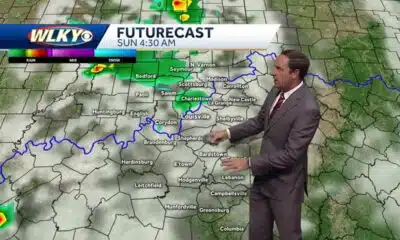News from the South - Missouri News Feed
Missouri lawmakers add grade-level performance to standardized test results
by Annelise Hanshaw, Missouri Independent
May 27, 2025
Missouri parents may soon have a better understanding of whether their child is performing at or above grade level on the state’s standardized test under a sweeping education bill awaiting the governor’s signature.
The legislation contains a provision that would require the state’s education department to add a fifth category to Missouri Assessment Program results, reporting “grade level” in addition to the current levels of “below basic,” “basic,” “proficient” and “advanced.” The new provision would include students in grades 3 to 8.
Need to get in touch?
Have a news tip?
State Rep. Brad Pollitt, a Sedalia Republican and former school superintendent, introduced the bill to make student performance more transparent to parents and lawmakers.
As an educator, he learned that students at grade level score at the upper end of “basic,” but many people incorrectly assume “proficient” means performing at grade level, he told The Independent.
“In order to have accurate conversations about where our students are at, we need to know what grade level is,” he said.
The Missouri Assessment Program, often referred to as the MAP test, began in the 1990s with five scoring thresholds. But in response to the federal No Child Left Behind Act, state lawmakers required the Department of Elementary and Secondary Education to align MAP with federal performance standards.
In December 2005, educators met to determine the new standards in line with the National Assessment of Educational Progress, or NAEP. They set thresholds based on the percentage of students scoring proficient on the NAEP so that the proportion of students deemed proficient on the state test would be close to the amount reported by the national test.
The National Center for Educational Statistics and the NAEP’s governing board have repeatedly clarified that proficiency reflects “solid academic performance” and “does not signify being on grade level.”
But policymakers, parents and other stakeholders speak about proficiency and grade level interchangeably. And candidates for public office, misinterpreting what proficient means, have used MAP data to push anti-public-education policies.
During former state Sen. Bill Eigel’s run for governor last year, he told ABC17 that “less than a third of our children are able to do reading, writing, arithmetic at grade level.” At the time, 33% of Missouri fourth graders scored proficient or advanced in reading on the NAEP, and math had higher performance levels.
Despite the test’s administrators explaining that this is not a measure of grade level performance, politicians and media reports still repeat the misrepresentation.
“Part of my frustration has been that people criticize public education pretty hard and say we’re failing our kids because 35% of our students in third grade or fifth grade are proficient or advanced in reading,” Pollitt said. “We may have 35% that are above grade level, but maybe 60% of our kids are at grade level. And I think that changes the conversation.”
In a House committee hearing in January, lobbyists for public-education groups spoke in favor of the bill.
Brandt Shields, director of governmental relations for the Missouri School Boards’ Association, said a fifth category would be more “informative” for stakeholders.
“Having only four categories is almost a crude way of trying to differentiate how those scores are interpreted,” he said.
No one spoke in opposition, but the Department of Elementary and Secondary Education’s lobbyist warned that the change would require work groups to set the new standards, which is estimated to cost just over $1 million.
The language passed by the legislature exempts the department from having to employ work groups, but Pollitt said it is up to administrators to decide.
GET THE MORNING HEADLINES.
Missouri Independent is part of States Newsroom, a nonprofit news network supported by grants and a coalition of donors as a 501c(3) public charity. Missouri Independent maintains editorial independence. Contact Editor Jason Hancock for questions: info@missouriindependent.com.
The post Missouri lawmakers add grade-level performance to standardized test results appeared first on missouriindependent.com
Note: The following A.I. based commentary is not part of the original article, reproduced above, but is offered in the hopes that it will promote greater media literacy and critical thinking, by making any potential bias more visible to the reader –Staff Editor.
Political Bias Rating: Centrist
This content presents a factual and balanced overview of a legislative proposal concerning education assessment in Missouri. It neutrally reports on the intentions of Republican State Rep. Brad Pollitt and includes perspectives from various stakeholders without editorializing or advocating strongly for or against the bill. The article focuses on clarifying technical aspects of standardized testing terminology and its implications for parents and policymakers, avoiding partisan framing. This balanced and informative reporting aligns with a centrist viewpoint.
News from the South - Missouri News Feed
Watch out for 'fly-by-night' contractors
SUMMARY: September is National Preparedness Month, reminding consumers to be cautious of “fly-by-night” contractors who often appear after storms, offering quick repairs for cash upfront but delivering poor or no work. These scammers frequently follow storms into new towns, promising great deals and falsely claiming local connections. The Better Business Bureau advises researching reliable contractors before disasters strike, as post-disaster urgency makes it easy to fall victim. Consumers should also review their insurance coverage to ensure proper protection. Resources like BBB and Ready.gov offer guides for preparedness, helping individuals plan ahead to avoid scams and make informed decisions during stressful times.
More information: BBB.org
News from the South - Missouri News Feed
Adam Wainwright’s odd story around the 9/11 attacks
SUMMARY: Before debuting with the St. Louis Cardinals, Adam Wainwright had a close brush with the Sept. 11, 2001 attacks. In early September 2001, Wainwright and his brother Trey planned a trip to New York City, initially to see a Yankees game that was rained out. Instead, they visited the Empire State Building on Sept. 10, capturing a photo with the World Trade Center behind them. They planned to visit the Baseball Hall of Fame on Sept. 11 but left New York early, narrowly avoiding the attacks. Wainwright later reflected on seeing smoke from the tragedy during their drive. He pitched for the Cardinals from 2005-2023, winning 200 games.
Read the full article
The post Adam Wainwright's odd story around the 9/11 attacks appeared first on fox2now.com
News from the South - Missouri News Feed
Charlie Kirk shooting: Weapon recovered in woods near Utah college campus, FBI says
SUMMARY: Charlie Kirk, conservative influencer and Turning Point USA co-founder, was fatally shot at Utah Valley University while speaking at an event. The FBI and Utah Department of Public Safety have not apprehended the suspect but tracked their movements before and after the shooting, including footage from the event and nearby doorbell cameras. The suspect, described as college-aged and blending with the crowd, allegedly shot Kirk from a distant rooftop using a high-powered bolt-action rifle, later abandoned in a wooded area. Authorities recovered physical evidence and urged the public to submit video footage. Two detained individuals were released, and the investigation continues.
The post Charlie Kirk shooting: Weapon recovered in woods near Utah college campus, FBI says appeared first on www.ozarksfirst.com
-
News from the South - North Carolina News Feed6 days ago
Reagan era credit pumps billions into North Carolina housing | North Carolina
-
News from the South - Alabama News Feed6 days ago
Amid opposition to Blount County medical waste facility, a mysterious Facebook page weighs in
-
News from the South - Kentucky News Feed6 days ago
3 states push to put the Ten Commandments back in school – banking on new guidance at the Supreme Court
-
News from the South - South Carolina News Feed6 days ago
South Carolina’s Tess Ferm Wins Miss America’s Teen 2026
-
News from the South - West Virginia News Feed7 days ago
National Grandparents Day (9-7-25) and the special bond shared with their grandchildren
-
Local News6 days ago
Duke University pilot project examining pros and cons of using artificial intelligence in college
-
News from the South - Missouri News Feed5 days ago
1587 Prime gives first look at food, cocktail menu ahead of grand opening in KC
-
News from the South - Virginia News Feed5 days ago
On the record: Winsome Earle-Sears








































